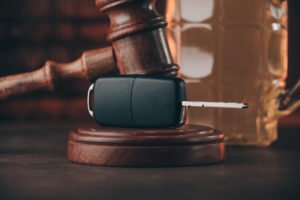
Nevada police must obtain a warrant before administering a forced blood draw on you if you are arrested for DUI and you refuse to take an evidentiary breath test or blood test.
Once police obtain the warrant, they may use “reasonable force” on you to carry out the forced blood test – such as strapping you down.1
Can police do a forced breath test?
Never. If you get arrested for DUI in Nevada, police can only force you to take a blood test if they secure a warrant from a judge first.
Breath tests require you to breathe a certain way into the breathalyzer machine. There is no way to physically force an uncooperative suspect to correctly breathe into the machine, even if they are strapped down.
In contrast, it is simple to extract a blood sample from an uncooperative suspect once they are strapped down.
Which DUI tests are required and which are optional?
If you get pulled over on suspicion of driving under the influence in Nevada, police will usually ask you to:
- take a preliminary breath test (PBT), which is required; and
- perform field sobriety tests (FSTs), which are optional.
(The field sobriety tests include the walk-and-turn, the one-legged-stand, and the horizontal gaze nystagmus tests.)
Then if the police arrest you for DUI, you are required to submit to an:
- evidentiary breath test; or
- evidentiary blood test.
Though if the police suspect you were driving under the influence of drugs (DUID), you are required to take the blood test since breath tests cannot accurately detect drugs.2
What happens if I refuse to take a preliminary breath test?
If you get pulled over in Nevada and refuse to take the preliminary breath test, the police officer will:
- confiscate your driver’s license right away; and
- arrest you for DUI.
Once you are arrested for drunk driving, you are required to take an evidentiary breath or blood test.3
What happens if I refuse to take the evidentiary breath or blood test?
If you get arrested for DUI in Nevada and refuse to take an evidentiary breath or blood test, the police can:
- get a warrant to administer a forced blood draw; and
- use reasonable force on you to obtain the blood sample.
Police are supposed to warn you that refusing an evidentiary test will result in your driver’s license being revoked. If you refuse anyway, you lose driving privileges for at least one year – even if you do not end up getting convicted of DUI.
Note that you can request a DMV hearing to contest the license revocation. Though if you lose, you may still be able to continue driving with an ignition interlock device in your car.
Also note that if your DUI case goes to trial (which is rare since most cases settle through a plea bargain), then the prosecution can admit evidence that you refused the test. Refusing to take the test could sway the judge to believe you were guilty of DUI.4

Police must obtain a judicial warrant before administering forced blood draws on DUI arrestees.


